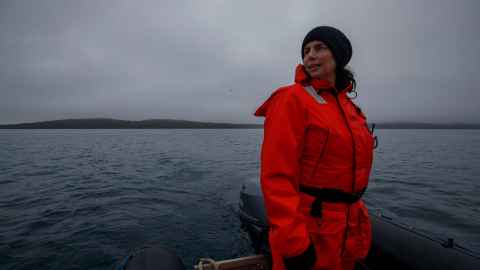Take 10 with... Rochelle Constantine
Professor Rochelle Constantine gives us 10 minutes of her time to discuss her research into unravelling complex questions about marine megafauna.

1. Describe your research topic to us in 10 words or less.
Multi-disciplinary research to unravel complex questions about marine megafauna
2. Now explain it in everyday terms!
I use many different research methods to understand the biology, behaviour, connectivity, interactions, and movement patterns of large marine animals; mainly whales and dolphins but increasingly sharks, rays, and seabirds. I like to see the things I study.
Using many different approaches means we can often answer questions faster which is useful if there is a conservation issue that needs addressing.
3. Describe some of your day-to-day research activities.
These days I spend a lot of time pulling together teams of very talented people and working out how science can advance our understanding of ocean life. That requires a lot of thinking and rethinking but it’s very rewarding when you see everyone’s ideas come together.
I’m always happy on the ocean watching animals interact with each other in dynamic communities, collecting data – biopsy samples, photos, drone imagery, behavioural observations – then seeing patterns emerge. Because I study long-lived animals, it’s always great to see a dolphin or whale I have known for a few decades. Then it’s back to the computer to mostly help hard-working post-grad students make sense of it all.
4. What do you enjoy most about your research?
Working with talented people to answer tough questions that make people stop and think about the ocean and its inhabitants. I have learned so much about genetics, telemetry, cultural connections, modelling, statistics, economics, acoustics… because of the many people I have the privilege of working with.
5. Tell us something that has surprised or amused you in the course of your research.
Despite all of the remarkable research and outreach, I’m always surprised how little people know about the ocean.
I am always pleasantly surprised and relieved when we go out and find Māui dolphins. The world’s rarest marine dolphin is still hanging in there.
6. How have you approached any challenges you’ve faced in your research?
Am I allowed to say I swear a lot sometimes? But then it’s about going out, getting fresh ideas, or revisiting where things didn’t work and getting going again. Unfortunately, timelines are dynamic when you work on wide-ranging animals that can travel tens or hundreds of kilometres in a day. Despite our best preparations, weather, gear failure or ‘where did the critters go’ are a fact of being a marine ecologist.
7. What questions have emerged as a result?
The challenges have led me to the multi-disciplinary approach where if we’re with a whale or a multi-species feeding aggregation, we collect as much data as we can. In only a few minutes we can approach a whale tag it, biopsy it, photograph it, measure it with a drone and then leave it alone. Decades later we revisit some of the original data and samples to answer questions as new technologies emerge. Pair that with local knowledge about what used to be in the ocean, and we have some powerful directions forward.
8. What kind of impact do you hope your research will have?
That every day, every person will stop and think about what they can do for the ocean because it keeps us alive and it needs a lot of help right now.
9. If you collaborate across the faculty or University, or outside the University, who do you work with and how does it benefit your research?
I had great academic mentors who embraced collaboration and don’t shy away from difficult problems, so it’s a normal way of working for me. My wide network includes long-time academics and technicians in SBS and IMS, Statistics, Engineering, our kaiārahi and recently computer vision programmers outside the University who are fast problem solvers. Grateful for awesome mana whenua who always make me stop and think, fishing, shipping industry, tenacious government, and NGO colleagues, and many research colleagues from overseas Universities. When I’m stuck, I will often go back to my PhD advisors Scott Baker, Dianne Brunton, Bernd Würsig and Nick Gales because they’re still awesome, and they’ve known me all my academic life.
10. What one piece of advice would you give your younger, less experienced research self?
Make some time for life away from research, you’ve got this, be patient, and pay more attention to the stats courses.